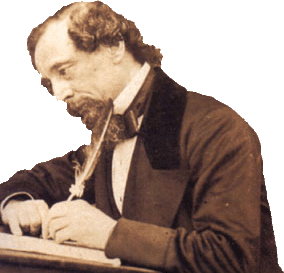I’m working on a project that involves transcribing several issues of the magazine that Dickens published, Household Words. As a result, he and I are forming a relationship of sorts that trancends space and time - I am typing his words just as he did, and am therefore absorbing some his thoughts and ideas in the process. Our first encounter was a lighthearted jaunt into the realm of the fruit import/export business. Next came the sad tale of the syche sharpeners, which was nothing if not silightly interesting. Then came his long winded and rambling questions about the infamous “They” in which I started to realize that I am doing more than just transcribing - I am having a conversation with a dead man. I am actually finding myself growling back at his words, or giggling, or sighing in frustration, or just asking him to make his damn point already. But today my transcriptions are introducing me to a side of Dickens that I knew existed, but had heretofore never experienced first hand: the pompous jackass:
What's most shocking about this essay? IT WAS WRITTEN BY A WOMAN - Eliza Lynn (later Linton). I know they existed in another time, essentially another world. I know how the Victorians valued the principle of “seperate spheres” for men and women - one public, and one private. But good lord, Dickens. Not all women wanted to be mothers, and that didn’t make them “a natural blunder.” It’s okay to want to extoll the virtues of motherhood, of domistic bliss, of the traditional family roles. But give me a break - even they had to have known what they were saying was just fodder for the masses and not really rational arguement. I can forgive them a bit because they knew their audience and Dickens was an entertainer at heart, but if they could only see how their “logic” becomes perverted even today by people who see women as less because we have actually achieved many of the goals that women of their time only imagined - despite our children turing out for the most part okay - they might change their tune a bit. Would Dickens really side with the ultra conservatives on this issue today? I don’t think he would, and that’s why I’ll keep transcribing the rest of this article, and all the others. The Victorians do have something to say to us today - but I can still get pissed at them.
Her flaccid muscles, tender skin, highly nervous organization, and aptitude for internal injury, decide the question of offices involving hard body labour; while the predominance of instinct over reason, and feeling over intellect, as a rule, unfits her for judicial or legislative command. Her power is essential a silent and unseen moral influence; her functions are those of a wife and mother. The emancipatists rate these functions very lightly, compared with the duty and delight of hauling in main-top-sails or speechifying at an election. They seem to regard the maternal race as a race apart, a kind of necessary cattle, just to keep up the stock; and even of these natural drudges the most gifted souls may give up their children to the care of others, as queen-bees give their young to the workers. Yet no woman who does her duty faithfully to her husband would find her time unemployed, or her life incomplete. The education of her children alone would sufficiently employ any true hearted woman; for education is not a matter of school-hours, but of that subtle influence of example which makes every moment a seed-time of future good or ill. And the woman who is too gifted, too intellectual, to find scope for her mind and heart in the education of her child, who pants for a more important work than the training of an immortal soul, who prefers quarter-decks and pulpits to a still home and a school-desk, is not a sea captain, nor a preacher by mission – she is simply not a woman. She is a natural blunder, a mere unfinished sketch; fit neither for quarter-decks nor for home, able neither to command men nor to educate children.


0 Comments:
Post a Comment
<< Home